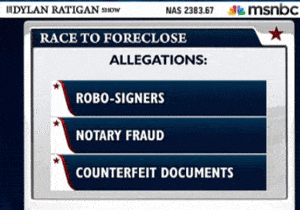
We all know that this recession we are in now is all due to our banks and Wall Street. With their haste to make as much money as possible, by reducing lending requirements, they created a housing market that had only one direction to go., down. They created a wave of foreclosures, Wall Street firms going out of business, along with some of the banks which created this mess. (An excellent analysis of what happened is in the book “Inside the Big Short, The Doomsday Machine” by Micheal Lewis)
Now, to compound this mess, banks have tighten credit requirements for home mortgages to the other extreme. What this means of course, is that it is not helping the housing market to recover.
Here’s a portion of an article appearing in the Wall Street Journal giving an example of the “new lending practices.”
“With the tightening of credit over the last few years by banks, more potential buyers find they are being shut out of home ownership, unable to obtain financing for their home purchase. And it’s not just buyers with poor credit histories being rejected for home loans–some buyers are even coming with stellar credit scores and big down payments, experts say.
For example, Amy Menell told The Wall Street Journal how a bank denied her for a home loan, despite her credit score being above 800, no debt, and having a down payment of more than 50 percent of the cost of the $400,000 home. However, Menell, who was in the process of finalizing a divorce, works as a real estate agent and didn’t have much income in 2009. While her business has picked up since then, she did not have the two years of documented income the banks wanted to process her loan application.
Other qualified buyers coming with good credit scores and credit histories are also finding themselves unable to get a home loan. Those who are having the toughest time are those who have seen their incomes drop or interrupted by a time of unemployment and self-employed applicants.
The percentage of mortgage applications rejected by the nation’s largest lenders increased last year: The country’s 10 largest mortgage lenders denied 26.8 percent of loan applications in 2010, which is up from 23.5 percent in 2009, according to an analysis by The Wall Street Journal.
The analysis showed denial rates for loans were highest in Miami, Detroit, and New Orleans. In Miami, for example, nearly 44 percent of home loan applications were denied last year (home prices in Miami have dropped by 50 percent since their 2006 peak), according to The Wall Street Journal. Lenders denied the fewest loans in Raleigh, N.C.; Bethesda, Md.; and San Jose, Calif.
An Ease in Sight?
Banks continue to be under pressure to avoid heavy losses, which fueled the tightened standards in the first place.
“Clearly we got too loose. This is a return to historical standards,” says Doug Duncan, Fannie’s chief economist.
Lenders don’t appear to have plans to ease credit soon either. Nearly four in 10 banks reported even tighter mortgage lending standards for the 12-month period ended in February, according to a survey by the Office of the Comptroller of the Currency. Only 8 percent of the banks surveyed said they had eased their credit standards”
Source: “Tighter Lending Crimps Housing,” The Wall Street Journal (June 25, 2011)
So let me know what you think.
Need help with a short sale?
Call or email:
John J. O’Dell Realtor® GRI
Real Estate Broker
O’Dell Realty
9530) 263-1091
jodell@nevadacounty.com






